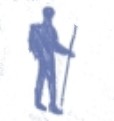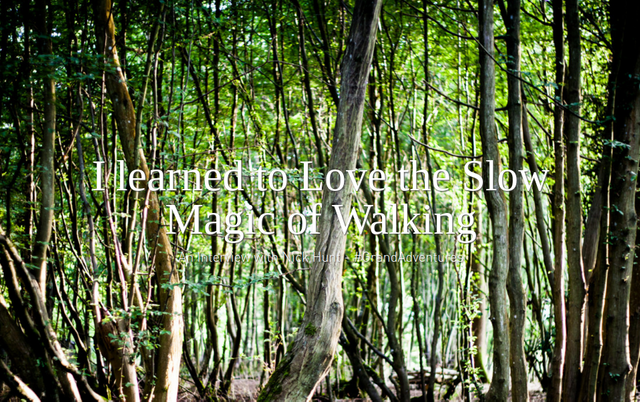Published: February 8, 2016
A few months ago, microadventurer Alastair Humpreys interviewed me about my walk to Istanbul. We had a great conversation about walking, travelling cheaply and the complexities of memory, and the interview appears in his new book Grand Adventures, which you can order here. In the meantime, Alastair has kindly given me permission to reprint the interview below. Hope you enjoy.
Alastair: Tell us about your walk.
Nick: I walked 2,500 miles across Europe, from the Hook of Holland to Istanbul. This was a dream I’d had since I was eighteen – following in the footsteps of the late travel writer Patrick Leigh Fermor, who did this walk in 1933-34 [the same as fellow Adventure1000 interviewee, Andy Ward]. My walk took me through Holland, Germany, Austria, Slovakia, Hungary, Romania, Bulgaria and Turkey, starting in the depths of the Central European winter and ending in the heat of the Balkan summer. I followed two major rivers and crossed three mountain ranges, finding accommodation in the homes of hospitable strangers, wild-camping in the woods, squatting in abandoned castles, sleeping rough when necessary – during the course of my journey I stayed in a Hungarian school, a Romanian nunnery, a Bulgarian monastery and a Transylvanian psychiatric hospital.
Alastair: How did you find walking? Obviously, it’s hard work, but what else became apparent as you got going?
Nick: The adjustment was hard at first, but I learned to love the slow magic of walking, the gradual shifts in landscape, culture, language and understanding, and the joy of solitude: what Tove Jansson called ‘one part expectation, and two parts spring sadness, and for the rest just a colossal delight at being alone.’
Alastair: I know you were inspired by Paddy Fermor (great choice, by the way!). But how did you turn your dream into reality?
Nick: First and most importantly I set a date for departure, a year in advance, and told ten people I was doing it. If you tell ten people you are doing something, you have no choice but to do it, otherwise there will always be someone saying “you know that thing you said you were going to do…?” You’ll never get any peace.
Then I started saving, and began a crowdfunding campaign to raise enough money to set off – perhaps more importantly than the money, this had the effect of publicising what I was doing even more, and when people I didn’t know started getting excited on my behalf, I had absolutely no chance of backing out. Other than this, however, I did very little preparation – I didn’t research the route, I didn’t look on Google Maps, I deliberately avoided travel guides, and I didn’t do any physical training. My idea was to use Patrick Leigh Fermor’s books, eighty years out of date, as my only travel guide. I wanted to let the continent surprise me, to have as few preconceptions as I possibly could.
Nick: A lot of crowdfunding can seem like that, yes – asking people to pay for you to do something exciting or fun – especially as more and more people take that route. I think it’s only perceived as worthwhile if it’s genuinely of interest to people apart from yourself, and of course the quality of what you produce – whether that’s a book, a record, an exhibition or anything else – will be what people judge your whole endeavour on. I was certainly fortunate in that people took a certain vicarious pleasure in following me doing this journey, as thousands of people seem to have dreamed of doing it themselves and never quite got round to it. I’m happy that the walk wasn’t just for my benefit – other people were able to enjoy it through me.
Alastair: What do you know now that you wish you’d known before your trip?
Nick: That a bit of physical training would have helped. I went through a fair amount of pain.
Alastair: How did you manage to live on the cheap?
Nick: Living cheap when walking is easy, especially if you’re prepared to rough it a bit and use sites like Couch Surfing for free accommodation instead of relying on hotels. Apart from food, wine, beer, chocolate and cigarettes – my psychological reward system at the end of each day – I didn’t really have anything to spend money on!
Alastair: I like the bit near the start of your book when you say “I took a few steps then stopped, not knowing how to start. All I had to do was walk. Surely it couldn’t be that simple?” I have been arguing all year that beginning is the hardest part of any project. Is that fair?
Nick: Yes, the first step is the hardest. But once you’ve decided to do something, and made the essential mental shift that binds you to a certain course, you’re over halfway there – once your plans have reached a certain momentum it suddenly it becomes much harder to stop than to carry on.
Alastair: You talked about “flirting with freedom” and “skirting the wilderness”. Did you feel that the relatively built-up nature of Europe was a bit of a safety blanket to your fears of being truly out in the wild, or did you find it frustrating and yearn for a bit more of a sense of being out on your own and alone?
Nick: I feel that all adventures walk the line between safety and danger, the familiar and the unknown, the thrill of being lost and the relief of safe return. It’s a fascinating psychological space, and the joy of my walk was balancing on that line and stepping from one side to the other, testing my reactions. Seemingly modern, built-up Europe can still feel surprisingly wild, mysterious and exciting if you’re in the right frame of mind, if you open yourself to possibility and allow imagination to flow – whereas you could put yourself in the middle of the Gobi Desert with an iPod and experience nothing more exciting than you would in your own front room. The freedom and the wilderness are inside you, not outside. There’s a great Arthur Machen quote: ‘He who cannot find wonder, mystery, awe, the sense of a new world and an undiscovered realm in the places by Gray’s Inn Road will never find those secrets elsewhere, not in the heart of Africa, not in the fabled hidden cities of Tibet.’ I’m a strong believer in that.
Alastair: How true did you feel Paddy’s journey was (i.e. how much did he make up)? And did that matter at all to you? (I ask this because in a book I wrote about walking across India I felt that I really had to manipulate and shuffle the truth to be able to tell the “truth” of how the journey felt to me. Does that make any sense?
Nick: Paddy didn’t write about his journey until four or five decades after he’d finished. He must have had a truly astounding memory, but all memory is an act of re-imagining the past, building it back up again layer after layer. I wouldn’t say he made it up, I’d say he recycled it, putting it back together in an order than wasn’t necessarily the same as it was originally, but was still completely honest in the truth it told. All writing is like this – there is no objectivity, and any act of storytelling involves shuffling the truth.
Alastair: What do you mean by the phrase “the sadness of arrival” when you reached the Black Sea? (I always feel this too.)
Nick: Throughout the course of that seven and a half months, I came to appreciate walking for its own sake, not for its usefulness in getting me somewhere. It became less a means to an end than an end in itself. There’s a great paradoxical disappointment in the act of arrival. Reaching the Black Sea, or indeed Istanbul, were things I’d looked forward to and imagined as an enormous triumph – but so often, travelling is more fulfilling than the destination, and when I finally got to those places, I felt a great sadness to think that the process of getting there was now at an end. Achieving something – anything – robs you of your purpose. I think this is why walking – or any other form of travel – is so addictive.
Alastair: If you did it again would you change your attitude to taking the occasional lift / public transport? This isn’t a loaded question – something that is “right” or “wrong” – I’m genuinely curious!
Nick: My intention was to follow Paddy’s journey as closely as I could, and he actually travelled by boat, train, horse and motorcar on various parts of this route. No-one offered me a lift on a boat, no-one lent me their car or their horse, so I actually ended up walking further than him in the end. I resorted to public transport when I injured my foot, and hitchhiked once or twice in a similar manner to when you’ve given up smoking and think it’s safe to have a cigarette – ‘I’ve beaten the habit now, so it’s okay to try it.’ But after weeks or months of walking, being on motorised transport was a deeply unpleasant experience – totally disorientating, incomprehensibly fast, and, in terms of understanding the journey utterly meaningless. The contrast was useful to think and write about, so I don’t regret doing it. I never aimed to be a puritan. But walking is definitely better!
Alastair: If I were to give you £1000 for an adventure, what would you go and do?
Nick: I’ve never taken a long sea voyage. If you were to give me £1000, I’d like to build some sort of craft to travel the old Viking sea-routes linking the Orkneys, the Shetlands, Faroe, Scandinavia and Iceland, to Greenland if I could. I’ve no idea if £1000 would even cover the cost of timber, but that’s what I’d like to do. Hopefully it would at least buy me enough rum to stay warm.


